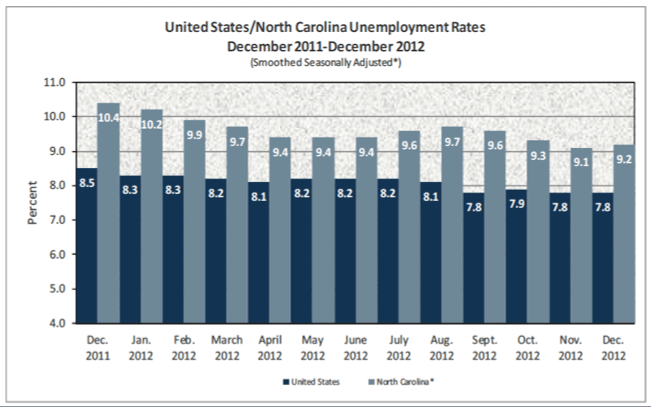Publisher's note: This article was written by Sarah Curry, who is the Director of Fiscal Policy Studies for the John Locke Foundation.
RALEIGH Now that state legislators have returned to work, one of their most important jobs is to approve a new state budget by July 1. This column discusses specific variables that affect our state's revenue and how those variables will impact our budget plans for the next biennium.
A huge variable is our state legislature itself, which began its work Wednesday. Discussions have been made about changes to our tax structure to make our state more competitive with its neighboring states. We will need to take some action as a result of the federal income tax code changes. State income taxes are tied to the federal tax code, and some of the changes recently enacted by Congress will have a significant impact on the state's revenue this next year.
2013 and beyond
North Carolina's economy is beginning to gain traction after a slowdown last spring and is expected to pick up pace as we move through 2013, according to state economists. Unfortunately, while our job creation has seen some small gains, it is not forecasted to increase enough to make a significant impact on our unemployment rate until mid-2014.
Key drivers and things to look for in reference to our state revenue are consumer spending, tourism, exports, and homebuilding -- none of which are expected to increase until our economy can operate closer to full capacity. Global economic risks and concerns over federal fiscal policy decisions continue to impact our state economy.
Trends tied to state revenue
Nonagricultural employment has increased by 145,000 since February 2010, but remains almost 182,000 below the peak in 2008. Jobs in the construction industry are 30.5 percent below their peak level (76,000 fewer jobs), while manufacturing is finally starting to turn the corner, growing 1.6 percent in the last year, but is still 89,600 below its peak.
Positive trends in the construction and manufacturing industries are triggers that typically lead the way in job growth coming out of an economic downturn. North Carolina's industry mix is well-positioned to take advantage of that type of recovery should federal and state fiscal policy not stunt our growth in the upcoming months. See the chart to compare North Carolina's unemployment recovery to that of the U.S. as a whole.
 Risks to our state revenue
Risks to our state revenue
Gov. Pat McCrory and state lawmakers need to keep in line with their campaign platforms to cut taxes and make North Carolina a more business-friendly environment. Having the highest corporate tax rate among our neighbors at 6.9 percent and the second-highest in the South does not give us revenue; it drives it to other states. Below is an outline of the major risks to our state revenue in the upcoming 2013 budget.
Fiscal cliff
Fiscal cliff decisions on spending cuts and the debt ceiling are still pending in Washington, which could lead to a drag on the economy similar to what occurred in late summer 2011. Many larger firms are postponing investment and hiring decisions, choosing to wait out the uncertainty of the fiscal cliff.
Incentives
Contrary to the views expressed in many news outlets, giving corporate welfare does not generate revenue. North Carolina gives away more than $660 million in incentives to big business every year. That's $660 million in revenue we don't have to allocate to infrastructure, schools, public safety, and other necessary items in our General Fund. Lowering the corporate tax rate would eliminate the need for incentives and bring business to North Carolina.
New small business exemption
Legislators passed a tax cut for businesses last June, a $50,000 business exemption. This will add volatility to the second half of the fiscal year, which is traditionally more volatile anyway. This tax cut will decrease state revenue by approximately $336 million per year. Where tax cuts are appreciated, a decrease in the corporate and personal income tax would alleviate the need for a temporary tax cut to small businesses and allow more accurate predictions of General Fund revenue.
Economic shocks
An economic shock is an event that produces a significant change within an economy and is unpredictable. One example is a shock to the supply of oil; it can cause the price to skyrocket making it expensive for individuals and businesses. The U.S. withstood the last few negative shocks while still within a recovery; another shock could slow growth in the upcoming months. Therefore, any projections of General Fund revenue could be recalculated in the event of a negative shock this spring or summer.

